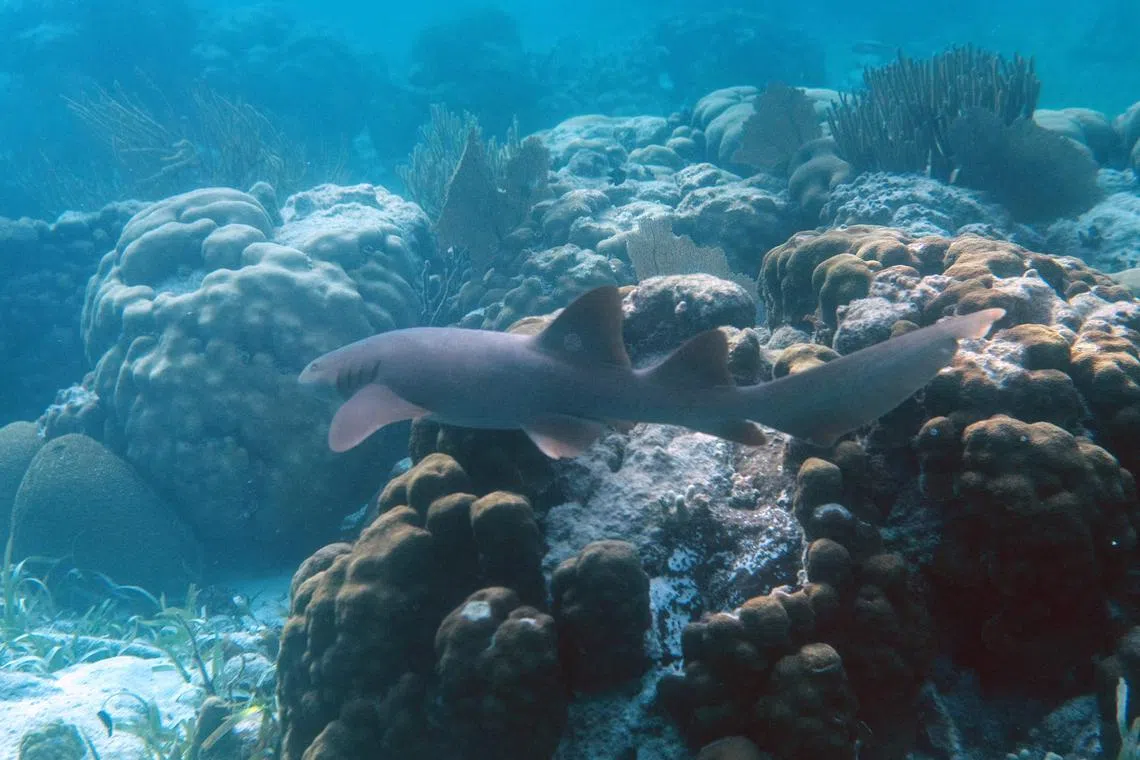Overfishing is pushing reef sharks towards extinction, a study shows
Sign up now: Get ST's newsletters delivered to your inbox

The loss of sharks causes ripple effects down the food chain.
PHOTO: AFP
WASHINGTON – Overfishing is driving coral reef sharks towards extinction, according to a global study out on Thursday that signals far greater peril to the marine predators than previously thought.
That matters to humans because sharks of this species act as managers of their marine ecosystems, maintaining delicately balanced food webs on which hundreds of millions of people rely.
The research, published in the journal Science, is the result of the Global FinPrint project, which collected more than 22,000 hours of video footage from reefs across Africa, the Middle East, Asia, Australasia and the Americas.
A team of more than 100 scientists found that five of the most common coral reef shark species – grey reef, nurse, Caribbean reef, blacktip reef and whitetip reef – declined by 60 per cent to 70 per cent.
The depletion data was derived from a computer model that estimated what shark numbers would have looked like without human pressures.
Sharks were entirely absent in 14 per cent of reefs where they had been previously documented.
Lead author Colin Simpfendorfer of James Cook University and the University of Tasmania told AFP that prior to the study, coral reef sharks – unlike their bigger cousins that dwell in deep oceans – were not thought to be doing badly.
“But when you sat down and looked at the overall results, it was quite stunning,” he said.
Ripple effects
The findings should help update the International Union for Conservation of Nature red list, with more species qualifying for “endangered” status, an important step towards conservation action.
Professor Simpfendorfer added that the overwhelming factor in the decline was overfishing, both targeting sharks for their fins and meat and unintentionally killing them as bycatch.
In terms of impacts, the loss of sharks causes ripple effects down the food chain.
The prey they eat increases in number, but the next level down decreases, and so on – creating unpredictable disruptions that risk human food security.

A nurse shark at a coral reef in Belize.
PHOTO: AFP
Reef sharks also keep herbivores in check, said Prof Simpfendorfer. When herbivores become more common, they eat more algae, which trap carbon for use in photosynthesis.
“Carbon sequestration on coral reefs without sharks is much lower than it is on reefs with sharks,” he said, meaning there is an impact on global warming.
Hope spots
Funding for the project came from the Paul G. Allen Family Foundation, which was responsible for the Great Elephant Census, a pan-African aerial survey of earth’s largest land animals.
In the shark study, scientists used baited remote underwater video stations – cameras with a small amount of oily fish hung on an arm of the device – to draw out and observe sharks in deployments that lasted an hour each.
In total, the scientists surveyed 391 coral reefs in 67 nations and territories using 22,756 cameras – generating three years’ worth of raw video.
Reefs with healthier populations tended to be in high-income countries with stronger regulations and greater levels of democratic participation, while lower-income countries generally had worse outcomes.
But the team also uncovered certain “hope spots” in developing countries, such as Sipadan Island in Malaysia and Lighthouse Reef in Belize.

“Hope spots” found included Malaysia’s Sipadan Island (above) and Lighthouse Reef in Belize.
PHOTO: TOURISM MALAYSIA
“In and around them, things are fairly depleted – but in those areas where you have strong MPAs (marine protected areas) and really good ways to enforce them, you have robust shark populations,” co-author Michael Heithaus of Florida International University told AFP.
This, he said, offered hope that heavily depleted areas can be repopulated as long as a source population is intact and careful management programmes are followed. AFP


